Jun 2022 2nd Edition
Jun 2022 2nd Edition Estelle Greeff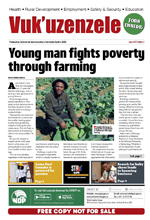
English PDF version
Translations
Afrikaans
isiNdebele
isiXhosa
isiZulu
Sepedi
Sesotho
Setswana
Siswati
Tshivenda
Xitsonga
Young man fights poverty through farming
Young man fights poverty through farming Estelle GreeffAgriculture is not only for old people, says 22-year-old Sandile Mahlangu, who is among a new generation of young farmers.
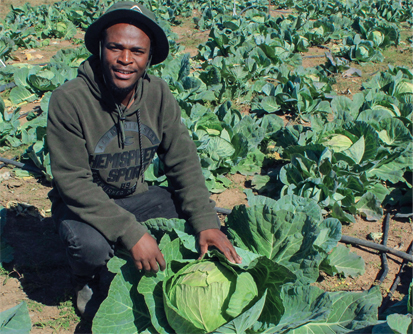 He encourages young people, especially in rural areas, to start farming now so that they can grow up learning the tricks of running a successful farm.
He encourages young people, especially in rural areas, to start farming now so that they can grow up learning the tricks of running a successful farm.
“Because jobs are scarce and the economy is currently not favourable, creating opportunities through farming instead of looking for a job makes sense. This will help us fight poverty and unemployment in our communities,” he says.
He says it is cheaper to acquire land in rural areas than in urban areas, and young people in rural areas must use this to their advantage.
“You can start planting vegetables in the backyard of your home to avoid buying vegetables from the shops,” he says.
Mahlangu is part of the Emrangeni Cooperative, which is a family business in Sokhulumi near Bronkhorstspruit in Gauteng. It has six members, three of whom are below the age of 35. At the moment, the cooperative is focused on crop production, but it hopes to expand its livestock operations.
The cooperative was established almost 10 years ago when Mahlangu’s father approached the tribal authority and asked for a piece of land to start farming.
He says his family bought about three hectares of land and in 2014, started fencing the farm. He says they only started working the land two years ago.
Mahlangu realised his passion for farming while growing up in nearby Wolvenkop, where he would tag along with his late grandfather, who was a farmer.
“The first time I was allowed to get on a tractor, I was so excited. I found it to be an interesting vehicle. Unfortunately, my grandfather passed away when I was still young,” he says.
After matric, Mahlangu enrolled for a National Diploma in Crop Production at the Tshwane University of Technology. While he is still in the process of completing his qualification, he says his education has only increased his passion for farming.
“This year, we started by planting spinach and in February, we planted cabbage on half a hectare, which is now ready for harvesting. We also planted sunflowers to produce feed for our chickens. Next season, we will plant watermelons, spinach and other vegetables,” he says.
The cooperative has so far created an additional two jobs.
“Our plan is to also build a chicken house and a pigsty. We will then be able to create more jobs. At the moment, we have 20 goats and 10 cattle. The chickens that we currently have are not for sale,” he says.
Agri-parks programme
The cooperative falls under Sokhulumi Agri-village, which is part of the Department of Agriculture, Land Reform and Rural Development (DALRRD) Agri-parks Programme.
This programme aims to address social and economic inequalities, unemployment and poverty within South African communities by empowering and supporting small-scale farmers and emerging commercial farmers.
Sokhulumi Agri-village received over R17 000 000 from the department.
Nine of the country’s agri-parks are in the City of Tshwane. Some started as agri-villages established by the city and some were established by the DALRRD, which says it is working with the Gauteng Department of Agriculture and Rural Development and the City of Tshwane to take care of all nine agri-parks.
Recently, Minister of Agriculture, Land Reform and Rural Development Thoko Didiza handed over agricultural equipment and other goods to members of Sokhulumi Agri-park’s Farmer Production Support Unit.
The farmers received four storage containers, fencing for three hectares, shade netting for two hectares, two tractors, implements, fertiliser, chemicals, insecticides, seeds and seedlings. They will also be assisted with site clearing. In addition, local security personnel have been appointed to protect the infrastructure.
“This is meant to assist smallholder farmers to maximise agricultural production, maintain their supply contracts, create jobs, enhance food security, stimulate agro-industrialisation and help to grow the country’s economy,” says Minister Didiza.
Mahlangu says the donation is going to help increase production. “Some of our produce did not grow to our satisfaction due to a lack of fertiliser, insecticides and other chemicals. This challenge has now been addressed, thanks to the DALRRD,” he says.
The cooperative sells its products to local markets across Bronkhorstspruit.
For more information regarding Agri-parks, contact 012 337 3750/ 012 337 3732/ 012 337 3734 / 012 337 3737
Forensic accountants to fight fraud and corruption
Forensic accountants to fight fraud and corruption Estelle GreeffThe Special Investigating Unit (SIU) has partnered with the South African Institute of Chartered Accountants (SAICA) and the North-West University (NWU) to train a new generation of forensic accountants.
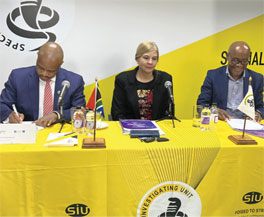 The three institutions recently signed a memorandum of understanding (MoU) that will see them join hands to produce specially trained accountants who will help intensify the fight against fraud and corruption in South Africa.
The three institutions recently signed a memorandum of understanding (MoU) that will see them join hands to produce specially trained accountants who will help intensify the fight against fraud and corruption in South Africa.
SIU National Chief Investigations Officer Leonard Lekgetho says forensic accountants assist in identifying fraud by checking if financial statements have been manipulated. “They also prepare financial evidence to prove in court that corruption occurred so that money can be recovered,” adds Lekgetho.
In terms of the MoU, a bursary fund has been established through SAICA’s Thuthuka Education Upliftment Fund (TEUF) for the training of these forensic accountants.
SIU Senior Manager for Learning and Development Enock Qoma says the aim is to ensure that the unit’s provincial offices have the skilled forensic accountants they need to fast track fraud and corruption investigations.
“The bursary will be funded by the SIU to the tune of R10 million,” says Qoma.
SIU Chief Human Capital Officer Neptune Masombuka says the formation of the MoU started in 2019, when they learnt that there were only 109 forensic accountants in South Africa.
The training comprises three programmes:
- The undergraduate placement, which consists of first-year Bachelor of Commerce (BCom) Forensic Accounting students from the NWU. For the 2022, 2023 and 2024 academic years, 10 students per year will be selected to join the three-year programme. These students will be employed by the SIU after they complete their studies.
- The postgraduate placement, which targets six forensic accounting students per year from the NWU. The students will join the SIU at a higher level upon completion of their training.
- Work-integrated learning, which will focus on upskilling the current SIU employees who hold BCom qualifications. These employees already know the organisation and have a sound understanding of the investigating methodology. They only require a practical work-integrated programme for six months to advance their skills.
Both undergraduate and postgraduate students have already been selected for the current academic year.

For the 2023 academic year, students should apply to both the NWU (www.studies.nwu.ac.za/studies/apply), for the Forensic Accountancy Programme and the TEUF (www.thuthukabursaryfund.co.za), for funding.
Applications for the bursary will close on 31 August 2022.
From the Union Buildings
From the Union Buildings Estelle GreeffBlack economic empowerment a must for growth
 In April this year, a landmark broad-based black economic empowerment transaction was concluded in the Eastern Cape that significantly improves the participation of black women-owned businesses in the energy sector.
In April this year, a landmark broad-based black economic empowerment transaction was concluded in the Eastern Cape that significantly improves the participation of black women-owned businesses in the energy sector.
A liquid bulk fuel terminal operated by BP Southern Africa in East London has been sold to Wasaa, an independent petrochemicals company. Wasaa has acquired all the terminal’s moveable assets and a 20 percent share in berth-to-terminal pipelines.
With the 2020 report by the Broad-Based Black Economic Empowerment Commission showing that most economic sectors are falling short of their black women ownership targets, this acquisition by a black and female-owned company of a liquid fuel terminal is a historic development.
It contributes to our national effort to redress inequality and ensure there is meaningful participation by the country’s majority in our economy.
Recently, I announced the appointment of the new Broad-Based Black Economic Empowerment Advisory Council, which comprises government, business, labour and other stakeholders. It was established to champion the cause of economic transformation.
The council has its origins in a 2001 report produced by the BEE Commission.
This report emanated from an extensive study into the structure of the South African economy, and what was needed to transform the economy, grow black entrepreneurship, ensure greater black management and ownership of businesses, and bring black women into the mainstream of the economy.
Next year, it will be two decades since the Broad-Based Black Economic Empowerment (B-BBEE) Act – which established the council – was passed.
Our commitment to entrench and deepen economic empowerment is unwavering. That is why black economic empowerment is an integral part of our economic reconstruction and recovery in the wake of the COVID-19 pandemic.
This is one of the reassurances I articulated to the Black Business Council earlier last month, where we discussed the state of B-BBEE in the country, the progress that has been made and what we need to do as a collective to build on our gains.
While there has been significant progress over the last two decades, there are some areas where there has been regression. We have gone backwards when it comes to increasing black management control, upscaling skills development, entrenching enterprise development and broadening procurement to give opportunities to black women and the youth.
The apartheid government deliberately built a distorted economy designed to benefit white people. The majority of South Africans were marginalised from the mainstream economy, with black entrepreneurs confined to small retail industries in the townships.
At the end of apartheid, black ownership of JSE-listed companies was less than 1 percent. This figure has not improved much in the past 28 years.
At the same time, there have been important private sector initiatives and deliberate measures by the state to facilitate greater and more meaningful participation of black people in the economy.
Between 2017 and 2020, nearly 500 empowerment transactions were submitted for registration to the B-BBEE Commission. In key sectors such as construction, property, information and communications technology, tourism and transport, black ownership has exceeded targets.
Economic transformation and economic growth are intertwined. There cannot be one without the other.
By integrating transformation into the process of industrialisation, we are advancing a more inclusive growth model that shares, rather than concentrates, wealth.
The Department of Trade, Industry and Competition (DTIC) is pursuing this goal through various programmes. They include a support programme for township businesses, export-related training by the Industrial Development Corporation (IDC) to black, women and youth-owned businesses, and increased infrastructure budget to SMMEs in the Tshwane Special Economic Zone.
Through sectoral masterplans we are driving localisation that benefits black owned businesses. For example, 10 black contract growers have been established with an investment of R336 million as part of the poultry masterplan. Government has also launched a black exporters network that will connect black-owned companies in food, engineering products, auto components, beauty products and other sectors of the economy.
As part of our drive to create a new generation of black industrialists, last year government approved R2.5 billion in new support to about 180 black industrialists in the form of loans from the IDC and National Empowerment Fund (NEF) and grants from the DTIC incentive scheme. Over the next three years a further R21 billion has been committed by the IDC, NEF and other institutions to support black industrialists. An additional R25 billion has been committed to support black, women, youth and worker-owned companies.
It is clear that much more work needs to be done to address the many challenges that black businesses face. This includes the difficulty of accessing start-up and expansion capital and the ability of SMMEs to find markets for their products. Black women-owned businesses, in particular, encounter difficulties in taking on large-scale empowerment transactions.
Breaking the cycle of underdevelopment through black economic empowerment is not just a moral imperative; it also makes business sense.
The continued exclusion of the black majority from the economy’s mainstream constrains economic growth, which ultimately impacts all business. Expanding the country’s entrepreneurial base is fundamental to growth.
We have a shared responsibility to drive the effort to entrench B-BBEE because it is about eradicating inequality. Unequal economies breed unequal societies, and unequal societies don’t grow and flourish.
It is not only wrong, but also unsustainable, for businesses to keep their management and ownership structures mostly white or male.
It is, after all, the South African public that are the primary consumers of their goods and services. This should be reflected in diversity of hiring and management practices, in ownership and in procurement.
Broad-based black economic empowerment will only be achieved through partnership and a shared commitment to transformation.
The appointment of the new B-BBEE Council will help us to expand the frontiers of broad-based black economic empowerment. I call on business, labour and industry to work with the council as it undertakes this vital work.
Safe and legal abortion is free
Safe and legal abortion is free Estelle GreeffThere is no justification for women to use an illegal and unsafe abortion clinic if they want to end their pregnancy.
 This is according to Deputy Minister of Health Dr Sibongiseni Dhlomo, who explains that, by law, all women have the right to terminate their pregnancy, for free, at a government hospital or clinic during the first 12 weeks.
This is according to Deputy Minister of Health Dr Sibongiseni Dhlomo, who explains that, by law, all women have the right to terminate their pregnancy, for free, at a government hospital or clinic during the first 12 weeks.
“It pains us as government leaders to see our people leaving safe and free health services, for whatever reason, to go and spend the last money they don’t have to pay someone to put their life at risk. There is no justification for women to correct an unplanned pregnancy with illegal and unsafe aborting because we all make mistakes. Illegal abortion is not an answer,” says Dr Dhlomo.
The Department of Health has 346 public health facilities that provide safe termination of pregnancy services, he adds.
These are located in the Eastern Cape (46), Free State (16), Gauteng (25), KwaZulu-Natal (56), Limpopo (54), Mpumalanga (27), Northern Cape (six), North West (26) and Western Cape (90).
Illegal abortion complications
The Acting Director for Maternal Child and Women’s Health at the KwaZulu-Natal Department of Health, Phalanndwa Muthuphei, says women can face many complications when having an abortion at an illegal abortion clinic.
“The immediate complications include severe bleeding, tearing of the cervix, severe damage to the genitals and abdomen, internal infection of the abdomen and blood poisoning.
“In the long-term, women could face a slightly increased risk of infertility, an ectopic pregnancy, a miscarriage or premature delivery or even death,” says Muthuphei.
“Women could also suffer emotional effects from an unsafe, illegal abortion, which include post-traumatic stress disorder, depression and problems with interpersonal relationships.
“Unsafe abortions can also lead to negative socio-economic impacts on women, children, families and communities,” she adds.
Legal abortion options
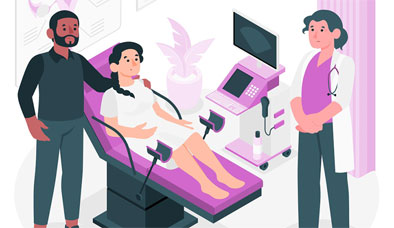 Muthuphei says women who want to end their pregnancy have safe and free options to do so at public clinics and hospitals.
Muthuphei says women who want to end their pregnancy have safe and free options to do so at public clinics and hospitals.
“A choice of methods should be available, all of which must be performed by a trained and experienced doctor or professional nurse,” she adds.
The options, either medical or surgical abortion, depend on how far along the woman’s pregnancy is.
Medical abortion, which involves taking two sets of pills to end the pregnancy, can be done up until nine weeks of pregnancy.
“The patient would then abort the foetus at home and not at a clinic or hospital,” says Muthuphei.
Surgical abortions are performed by a registered nurse (up to 12 weeks) or a doctor (from 12 to 20 weeks).
According to the Choice on Termination of Pregnancy Act No 92 Of 1996 (the Act), an abortion can also be performed from 13 to 20 weeks if a doctor, after consultation with a pregnant woman, believes that:
- The continued pregnancy poses an injury risk to the woman’s physical or mental health.
- There’s a substantial risk that the foetus would suffer from a severe physical or mental abnormality.
- The pregnancy resulted from rape or incest.
- The continued pregnancy would significantly affect the woman’s social or economic circumstances.
An abortion can also take place after the 20th week if a doctor, after consultation with a registered midwife, believes that the continued pregnancy would endanger the woman’s life, result in a severe malformation of the foetus or pose a risk of injury to the foetus.
According to the Act, all women, even if they are a minor under the age of 18, have the right to terminate a pregnancy.
They do not need permission from their parents or guardian. According to the Western Cape Department of Health, if you are a minor, you will be advised to talk to an adult you can trust and to bring someone with you to your appointment. However, you do not have to do so.
For more information about free, legal abortion services or pregnancy and contraception advice, visit your closest public healthcare facility.
Lamo Fuel founder is powered by passion
Lamo Fuel founder is powered by passion Estelle GreeffA passion for clean and green energy solutions and lowered carbon emissions inspired Kealeboga Tshikovhi to start Lamo Fuel in her hometown of Kuruman in the Northern Cape.
 Lamo Fuel (also known as Tehilla Legacy) is a commercial bio-energy products manufacturer that produces biodiesel, bio-oil, charcoal and biogas.
Lamo Fuel (also known as Tehilla Legacy) is a commercial bio-energy products manufacturer that produces biodiesel, bio-oil, charcoal and biogas.
Bio-energy is renewable energy produced from natural sources. In Lamo’s case, locally sourced used cooking oil is used.
“I started Lamo Fuel in 2014, at a time when the call for renewable energy integration into the mainstream economy was intensified. Despite the passion that fuelled me, I stumbled upon a few challenges. The main issue was finding a viable biodiesel plant with adequate machinery,” explains Tshikovhi.
In her quest to find out more about the sector, she completed a three-year business incubation programme at the Biofuels Business Incubator.
Following much hard work and saving capital from her pre-existing catering company, Tshikovhi secured a small-scale production plant in Dikgweng Village outside of Kuruman.
“I managed to start my production and acquire machinery. At present, I have a team of three that assists with admin and general work.”
Funding
In 2021, Tshikovhi approached the National Youth Development Agency (NYDA) for funding to purchase more efficient equipment for her company.
“The NYDA has helped me a lot. We experienced some challenges in the production process due to our purification system. Thanks to the R50 000 grant we received from them, we were able to change the purification system and improve the quality of the product. The agency continues to give us support, including non-financial services,” says Tshikovhi.
She adds that the new machinery has enabled her firm to explore the manufacturing of cleaning materials and she hopes to venture into chemicals supply.
“Our main markets are mining and construction companies operating in the Northern Cape and North West. We are currently increasing capacity from 200-litres per day to 1 000-litres per day of biodiesel.”
Tshikovhi encourages young people to tackle unfamiliar business ideas.
“We have plans to encourage and promote kids in high school to choose science and technology; we will also offer mentorship and tutoring as a company. For now, we are involved in entrepreneurial forums to promote local brands and encourage people to buy local. We are hoping for more partnerships and collaborations.”
Future accountants helped to sharpen their skills
Future accountants helped to sharpen their skills Estelle GreeffMpumalanga Provincial Treasury has welcomed its second intake of trainee accountants to its Public Finance Management (PFM) Learnership Programme.
 The 30 trainees will be placed across various departments, municipalities and state entities in the province.
The 30 trainees will be placed across various departments, municipalities and state entities in the province.
Initiated in 2019, the PFM Learnership Programme is a three-year blended training programme that is facilitated by the South African Institute of Professional Accountants (SAIPA).
It is offered at NQF level 8 (honours) and includes academic and practical work to widen the trainees’ technical and practical skills.
Cyril Dlamini, Mpumalanga Treasury’s General Manager of Assets and Liabilities Management, says the programme will help the department to improve economic discipline, accountability and effective governance, in accordance with the Public Finance Management Act (PFMA) and the Municipal Finance Management Act (MFMA).
He says they want to ensure they have enough competent professionals so that public resources can be properly used and managed.
The purpose of both the PFMA and MFMA is to create sound and sustainable management of the financial affairs of government. The PFMA applies to the national and provincial spheres of government, while the MFMA applies to local government.
Dimpho Mashigo (27) of White River is one of the 30 trainees. He holds a Bachelor of Commerce in Accounting from the University of Witwatersrand.
Mashigo applied for the programme after seeing an advert on social media in September 2021. “I applied online and was fortunate to be chosen.”
“This programme will give me an opportunity to gain work experience and, importantly, a rare chance to become a qualified professional accountant. I also hope to find permanent employment after three years. This is an excellent opportunity for me to contribute to the profession and my government, while learning the practical side of the trade.”
Trainees are mentored by a qualified professional accountant who works at a management level in provincial and local government.
Karl Smith, Head of Education, Training, and Support at SAIPA, welcomed the collaboration with the Mpumalanga Provincial Treasury, saying that it assists the institution to maintain a pool of competent and qualified accountants.
Mpumalanga Treasury says another intake of students is planned for 2025. “The department advertises the opportunities widely within the province to reach as many graduates as possible. We are also planning to engage the relevant faculties in universities as part of broadening access to information,” it noted in a statement.
For similar opportunities, visit www.treasury.mpg.gov.za
Keeping business afloat
Keeping business afloat Estelle GreeffDespite the recent heavy rains in KwaZulu-Natal causing widespread damage, a young entrepreneur is urging people not to give up on their dreams of running their own businesses.
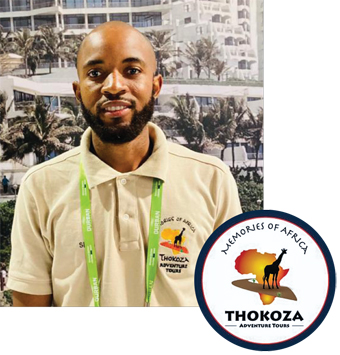 Born and bred in Pietermaritzburg, Siyabonga Kheswa (29) is the founder of Thokoza Adventure Tours, a tour operator formed in 2017.
Born and bred in Pietermaritzburg, Siyabonga Kheswa (29) is the founder of Thokoza Adventure Tours, a tour operator formed in 2017.
The floods, which led to over 400 deaths and the loss of livelihoods, badly affected Kheswa’s three-person business.
He says tourism was taking off again after COVID-19 and they had created different tour packages and started a new marketing campaign. Many inquiries were received, he says, but then the floods happened and people did not finalise their bookings.
The company organises tourism experiences, including the booking of accommodation, activities and shuttle transfers, among others.
Thokoza Adventure Tours also takes groups of students on educational excursions. For high school pupils, the company offers activities like quad biking and camping. University students get involved in conservation initiatives, such as the tracking of animals.
Kheswa, who holds an Honours degree in Eco-Tourism Management, says he loved nature from a young age. “I had to do a six-month internship as part of my degree and I did it at a nature training school in Zululand. That is when I went to a game reserve. It was a feeling of awe, seeing a lion for the first time in the wild,” he says, adding that not many black children are exposed to nature and conservation.
“There is a lack of knowledge about how critical our natural species are. The lack of knowledge equates to no active involvement in conservation,” says Kheswa.
As South Africa marks Youth Month, Kheswa, who is currently studying for a Master of Commerce in Tourism Management through the University of South Africa, urges young business people to honour the spirit of the youth of 1976 by not giving up on the fight to gain economic freedom.
“One of the key lessons I have learnt is that you need to be patient. Your business is not going to boom overnight. You must invest time into it and keep on keeping on; eventually, your business is bound to succeed,” he says.
For more information about Thokoza Adventure Tours visit www.tatours.co.za
A taste of home, in a can!
A taste of home, in a can! Estelle GreeffGrowing up in rural Limpopo with tasty chicken feet and necks as one of his most-loved meals inspired entrepreneur Eiren Drake (27) to can the widely enjoyed traditional dish for all South Africans to enjoy.
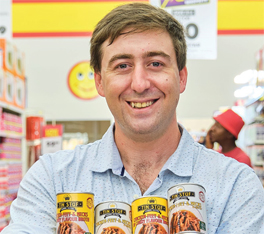 Drake, the Founder of Tin Stuf, says he was lucky to be exposed to chicken feet, necks and pap as a child.
Drake, the Founder of Tin Stuf, says he was lucky to be exposed to chicken feet, necks and pap as a child.
Born in Tzaneen, Drake spent most of his weekends with his grandparents on their timber farm in George’s Valley. He spent a significant amount of time with his late grandfather’s employees, whose children were his friends.
“This is when I was introduced to chicken feet, which is still one of my favourite meals,” he confirms.
Later in life, when Drake became aware of the importance of food security, he developed an interest in different preparation methods for traditional South African foods.
“There is a lack of access to affordable, nutritious protein, especially meat products. This is where the idea for Tin Stuf came from. My grandfather, was my father figure, was the brain behind the innovation,” says Drake.
He explains that it’s hard for many people to obtain chicken or meat, as they have to travel to places that are hard to reach. “They also don’t have a freezer and can’t afford electricity. This ignited my passion to find a solution to these challenges,” says Drake.
While Tin Stuf was registered in 2017, its canning facility only commenced commercial-scale operations in early 2020. The factory now employs 35 people, including several of Drake’s childhood friends who introduced him to the dish.
“They are the very people behind our innovation to develop a new product concept and our inspiration to follow through and attempt to launch it,” says Drake.
“I have the capacity to double this number of employees, with the introduction of a night shift, if the demand for the product continues to grow,” he adds.
In February 2022, Drake was approached by the Shoprite Group and agreed to a three-year exclusive deal to supply the retailer.
The product is also available online, via Takealot.com; directly from the factory; and from a few wholesalers and informal retailers in the northern parts of South Africa.
Drake’s advice to the youth is to believe you can be successful. “Decide on your goals and believe in achieving them with unwavering passion. Listen to other people’s advice and do whatever it takes to turn your dreams into reality. You can.”
For more information, visit www.tinstuf.com.
Helping young people realise their dreams
Helping young people realise their dreams Estelle GreeffA specialised fund set up by a state youth development agency helps youngsters and civil sector organisations with once-off funding.
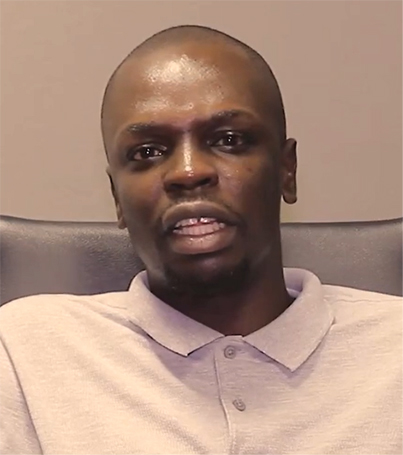 Thusano, meaning ‘a helping hand’, is exactly what the National Youth Development Agency (NYDA) does through its Thusano Fund, which was established to ensure a brighter future for South Africa’s youth and non-governmental organisations (NGOs).
Thusano, meaning ‘a helping hand’, is exactly what the National Youth Development Agency (NYDA) does through its Thusano Fund, which was established to ensure a brighter future for South Africa’s youth and non-governmental organisations (NGOs).
The fund assists students with their day-to-day needs during their education and skills training journey.
The fund was established in 2014 and serves two primary purposes:
• Supporting students who do not qualify for the National Student Financial Aid Scheme funding, but cannot afford to cover all the costs of their tertiary education. Many of these students are in debt or arrears with school fees.
• Assisting young people who are making a difference in their communities.
“Though the Thusano Fund, the NYDA plays an important role in helping students unlock funding to complete their studies,” says NYDA Chief Executive Officer Waseem Carrim. He notes that by supporting young people’s community-based initiatives, the fund enables them to access resources needed to identify and implement social change.
One of the beneficiaries of the fund, Julian Zwane, who was raised by a single father who fell ill when she was doing her final year at university, heard about the initiative on social media and applied for money to cover her debt at the University of the Witwatersrand.
Zwane, who was struggling to pay off debt because bursaries were not covering outstanding fees, says she is hopeful for a better future.
“Now that I have my degree, I can apply for jobs which are in line with my career prospects,” she says.
Another beneficiary, Michael Ngobeni, stopped studying because he couldn’t afford to pay. “The debt weighed heavily on me. I had to suspend my studies for four years, despite having only four modules left.”
The agency helped Ngobeni pay off the debt and continue with his studies.
Dumisani Ndluli owed money to the University of Pretoria. With assistance from the NYDA, he completed his bachelor’s degree in animal science.
He is paying his good fortune forward by using his degree for the greater good of his community. “When I am back home in Mpumalanga, I assist my community, especially pensioners, with vaccinating their livestock.”
How to apply
The fund will consider the following applications:
• Requests of up to and including R50 000 per candidate or organisation.
• Individuals requiring funds to settle overdue tertiary or school fees.
• Individuals aiming to pursue short courses.
• NGOs requiring once-off financial support.
• NGOs in need of equipment.
• Events for social development or awareness.
How to register on the NYDA online portal.
• Visit https://erp.nyda.gov.za/
• Click on the ‘youth enquiry’ button or ‘register’ menu item at the top (alternatively, follow this link (https://erp.nyda.gov.za/register-youth).
• Complete the youth enquiry/registration form (take note of the nearest branch that you select, as all future applications will be redirected to that branch for processing).
• Your registration request will be processed by a branch administrator.
• You will get an email invitation to the ERP system.
• Once you have activated your account, you can log in and apply for Thusano funding or other available products and services.
Additional information supplied by the NYDA.
For more information about the Thusano Fund, go to www.nyda.gov.za
R350 grants will be paid
R350 grants will be paid Estelle GreeffMinister in the Presidency Mondli Gungubele has reiterated government’s commitment to pay out the R350 Social Relief of Distress Grants (SRD Grant) to beneficiaries.
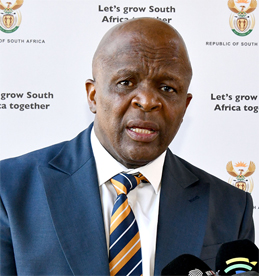 This came after recent reports that some grant beneficiaries had not received payments for up to three months.
This came after recent reports that some grant beneficiaries had not received payments for up to three months.
“This government will always fulfil whatever undertaking it has [with regards to the SRD].
The Minister was briefing media recently after a Cabinet meeting.
He also said the executive has welcomed the launch of the Social Employment Fund.
The fund is a partnership between the Industrial Development Corporation (IDC), the Presidency and Department of Trade, Industry and Competition (dtic).
“The support will provide bridging employment opportunities for up to 50 000 young persons in socially-useful work being done in local communities.
“The support will include health and community care, food and nutrition support like soup kitchens, promotion of literacy, greening and climate change mitigation programmes, as well as youth support initiatives. The fund will support 26 community and not-for-profit enterprises,” he said.
Minister Gungubele said Cabinet also reflected on last month’s launch of the Black Exporters Network by the dtic.
“Cabinet also welcomed the establishment of the Black Exporters Network by the Department of Trade, Industry and Competition, to bring together black-owned firms, which are currently exporting locally-made goods to other parts of the world.
“The network will enable the sharing of information, experience and know-how, and builds on successes from the Black Industrialists Programme,” he said. SAnews.gov.za
For more information about the SRD Grant visit www.srd.sassa.gov.za
For more information about the Social Employment Fund call 0860 693 888 or email: callcentre@idc.co.za
R500m to rebuild damaged KZN infrastructure
R500m to rebuild damaged KZN infrastructure Estelle GreeffThe KwaZulu-Natal (KZN) Provincial Government has unveiled a multimillion rand project, which will lead to the upgrade and rehabilitation of strategic roads damaged by the recent floods.
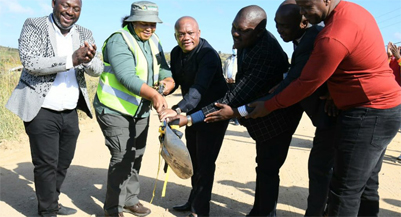 Recently launched in Mbumbulu, the R500 million road project is part of the provincial government’s continued effort to rebuild transport infrastructure that was damaged by the floods.
Recently launched in Mbumbulu, the R500 million road project is part of the provincial government’s continued effort to rebuild transport infrastructure that was damaged by the floods.
KZN Premier Sihle Zikalala led the launch of the infrastructure turnaround plan which includes the upgrading of section P725 from blacktop to tar, and the rehabilitating of another section of the road that was severely damaged.
More than R409 million has been allocated for the upgrading – with R86.5 million allocated to rehabilitate the stretch of the road from eNgonyameni and uMlazi section.
The road is vital in connecting many wards between uMbumbulu, eFolweni, eNgonyameni and uMlazi. It also provides a link to the R603, which is strategic for the movement of goods.
Premier Zikalala said the launch is part of the provincial government’s commitment to restore the provincial economy and ensure connectivity in many communities.
He noted that areas surrounding eThekwini Metro were the hardest hit by the recent floods.
The province, through the provincial Department of Transport, has to reprioritise budget allocation for this financial year to attend to urgent emergency repairs.
“Working with the South African National Roads Agency (SANRAL), the department is also attending to projects such as the N2, R102 and M4. The province is moving with speed in restoring damaged infrastructure and will continue to prioritise those communities that were most affected,” Premier Zikalala said.
The construction and rehabilitation of a section of a road is a living testimony that "as the provincial government we are serious about fulfilling the commitment of recovery and reconstruction.”
“This investment will ensure that the people of eThekwini are able to connect and link with important facilities. This will also create jobs and much-needed economic growth for the area.
“Importantly, it will open economic activities which will benefit the emerging small entrepreneurs which were affected by the recent floods,” Premier Zikalala said.
Premier Zikalala made a commitment that the provincial government will be unveiling a number of projects in the next few weeks and handing them over to contractors who will be doing repairs.
He said the province has more than 1 365 projects that were affected by floods and needs in excess of R6.5 billion to fix them. –
SAnews.gov.za
Search for baby shoes leads to booming business
Search for baby shoes leads to booming business Estelle GreeffWhen Tshepiso Monamodi could not find comfortable shoes for her baby, she decided to try and make a pair herself and five years later, her hand-made shoes can be found on the shelves of a major retailer.
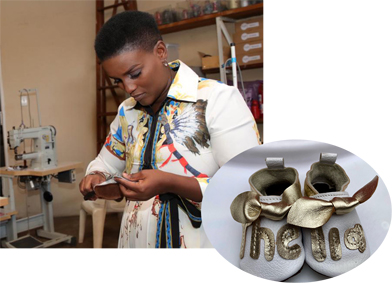 Monamodi’s entrepreneurial journey began in 2017 after the birth of her son. He had chubby feet and she could not find shoes that were a good fit. She was told about a brand that might work, but they cost R400.
Monamodi’s entrepreneurial journey began in 2017 after the birth of her son. He had chubby feet and she could not find shoes that were a good fit. She was told about a brand that might work, but they cost R400.
“It then crossed my mind that maybe I could make them myself,” says Monamodi.
Despite not knowing how to sew, she was encouraged by her husband to tackle the project.
“While looking for a sewing machine, I came across a lady at a store in Gezina. She asked what I was looking to do, and I showed her a picture of the shoes.”
When the woman heard Monamodi’s story, she said she would only sell a sewing machine to her once she was able to use it. So every Friday afternoon, for three months, Monamodi took lessons at the shop.
“She put the machine in the back corner and taught me everything – from threading to the selection of needles and so forth.”
Once Monamodi had mastered sewing, she spent December 2017 sewing shoes in one of her children’s rooms – and Oratile Kids was born. In a month, she says, she would make about 20 pairs to sell at market stalls in Pretoria.
The business took off during the COVID-19 pandemic in 2020. “The pandemic came with a hectic lockdown. I had no idea how social media worked, but we somehow managed to go online and it caught on,” she says.
She went from selling 20 pairs at a market to selling 10 pairs a day via social media.
When Monamodi received an email from Clicks, she first thought it was a prank, but the retailer had heard about Oratile Kids and wanted to sell the shoes at Clicks Baby stores.
Monamodi now employs two full-time staff and three interns who started in June.
The business recently secured funding and operating space from the Gauteng government’s Innovation Hub eKasiLabs, which supports entrepreneurs and has facilities across the province.
Monamodi says she will use the money to buy more sewing machines. “We will be increasing the stores we sell at to 20, but we also want to increase the product range and cater for children up to five years old.”
For more information, contact the Innovation Hub at 012 844 0000.
DBE opens doors of opportunity to thousands of youth
DBE opens doors of opportunity to thousands of youth Estelle GreeffGovernment, through its Basic Education Employment Initiative (BEEI), is contributing to the fight against unemployment by enabling unemployed youth to become education assistants and general school assistants around the country.
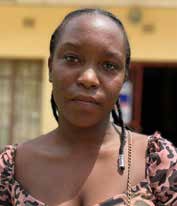 This is part of the Presidential Youth Employment Initiative, which forms part of the Presidential Employment Stimulus set up in 2020 in response to the devastating impact of the Coronavirus pandemic on employment.
This is part of the Presidential Youth Employment Initiative, which forms part of the Presidential Employment Stimulus set up in 2020 in response to the devastating impact of the Coronavirus pandemic on employment.
The BEEI created a cumulative 590 000 employment opportunities in phases 1 and 2. The Department of Basic Education (DBE) says one of the objectives of the BEEI is to skill the beneficiaries through orientation and training that is provided through various partners.
In April, as part of the third phase of the programme, the DBE offered new contracts to more than 250 000 qualifying candidates who were already part of the programme in Phase 2. According to the department, they were placed in different schools for their five-month contract.
The DBE says some of the youth did not proceed to Phase 3 because they did not meet the requirements. Some were removed from the programme following reports of misconduct, including absenteeism and involvement in criminal activities. Others were beneficiaries of the R350 grant and thus did not qualify for the programme.
Beneficiaries’ stories
Charmaine Afucara (22) says the programme provided much-needed relief to her and her family.
She is employed at Magigwana Secondary School in Mpumalanga as an education assistant and helps teachers with the marking of learners’ books and learners with reading. Before obtaining the teacher assistant post, she had been volunteering at another school.
Coming from a disadvantaged background, Afucara says life was tough for her before she got the job as she did not have an income.
The initiative also provided a lifeline for a Gauteng-based education assistant, Cli-Anne Symons (24), who holds a Bachelor of Administration honours degree. She heard about the DBE opportunity from a friend and applied on the SA Youth website.
Before getting the post, Symons could only secure odd jobs and was battling depression as a result of unemployment.
Becoming an education assistant
People aged between 18 and 35 qualify to apply as education assistants. They must have passed matric English. An NQF level 4, 6 and 7 qualification certificate is an added advantage. Applicants must not be employed or be undergoing education or training. They must not be receiving any form of government grant, stipend or wage.
The DBE says Phase 4 recruitment will start in September 2022, targeting youth who did not participate in the earlier phases. December 2022 and January 2023 will be used for training, with placement in February 2023.
Keep watching the data-free SAYouth.mobi website for updates.
TVET college principals called to promote work placement
TVET college principals called to promote work placement Estelle GreeffHigher Education and Training Minister Dr Blade Nzimande is calling on all college principals to promote work placement and partnership with industry for the benefit of future artisans.
 The Minister recently addressed the WorldSkills South Africa (WSZA) National Competition opening ceremony held at the Inkosi Albert Luthuli International Convention Centre in KwaZulu-Natal (KZN).
The Minister recently addressed the WorldSkills South Africa (WSZA) National Competition opening ceremony held at the Inkosi Albert Luthuli International Convention Centre in KwaZulu-Natal (KZN).
He says the competition was an important mechanism to promote artisan skills as a viable career choice, as well as to open up potential partnerships with industry.
It provided a platform for the country to assess the levels of apprenticeship and artisan training, in addition to advocating for the uptake of artisan careers as careers of first choice.
Minister Nzimande says the colleges should implement “quality industry driven curriculum” in line with the department's expansion plans in the TVET sector by engaging employers with the purpose of strengthening and improving the curriculum, so that students can be directed on the right path.
“We have now incorporated into our plans that all college principals must have the issue of work placement and partnership with industry in their performance agreements. Any college principal who does not promote work placement has no place in our TVET college system,” says the Minister.
As South Africa nears the end of a successful Decade of the Artisan Programme, and the 10th Anniversary of the White Paper for Post School Education and Training (November 2013 to November 2023), the Minister says artisan training should be escalated.
“We need to deepen partnership with employers and industry,” he says.
Innovation and 4IR
Minister Nzimande says the competition is also important for the improvement of South Africa’s vocational skills, coupled with finding new innovation methods as dictated by the fourth Industrial Revolution (4IR) in order to grow the economy and create more jobs.
“We joined this competition just under 10 years ago because we wanted to judge our own skills and knowledge gains the best in the world,” he says.
This will allow the country to know exactly the nature and scale of the challenge it faces and what needs to be done to produce truly excellent and competent artisans. – SAnews.gov.za
SA needs skilled tradesmen
SA needs skilled tradesmen Estelle GreeffSouth Africa needs more artisans such as bricklayers, diesel mechanics, instrument technicians, riggers, auto electricians and millwrights.
 The Department of Higher Education, Science and Innovation says there is a high demand for tradesmen, who are highly skilled and who primarily work in a technical field, doing skilled manual labour.
The Department of Higher Education, Science and Innovation says there is a high demand for tradesmen, who are highly skilled and who primarily work in a technical field, doing skilled manual labour.
Minister Dr Blade Nzimande says the department is working hard to encourage young people to become artisans. “In 2014, we launched the Decade of the Artisan, which seeks to promote artisanship as a career of choice for South Africa’s youth and highlight skills development opportunities for artisans.”
A successful artisan
Mihle Mvelakubi (25) from Flagstaff in the Eastern Cape owns Mvelakubi Civil Engineering and Projects, which does bricklaying, tiling, plumbing and paving.
Mvelakubi says his passion started when he was a learner at Agulhas School of Skills in Napier in the Western Cape, where he specialised in bricklaying and plastering, woodwork, welding and agriculture.
After school, he chose the technical and vocational education and training (TVET) route, doing an NC(V) Civil Engineering and Building Construction Level 2-4 programme and eventually obtained a National Diploma in Civil Engineering and Building after completing his N4 to N6 at the College of Cape Town TVET.
In 2017, he represented South Africa in bricklaying at the WorldSkills International Competition in the United Arab Emirates. “The competition helped me realise that bricklaying is not just a trade, but it is also an art that I had developed through consistent practice, great mentorship and guidance.
“Without skills, we wouldn’t have had any of the things we have all over the world, such as buildings, cars, aeroplanes and trains. "For the economy to grow, we need all these skills and critical thinking. It is the TVET institutions that create these skilled people," says Mvelakubi.
How to become an artisan
To enter a recognised learning programme to become an artisan, you must get at least 40% for mathematics (excluding maths literacy) and a Grade Nine or National Certificate level 2 pass.
You will need to attend a TVET college and then do workplace learning before being able to take a trade test, which will certify you as a qualified artisan. Trade tests can be done at a national trade test centre that is accredited by the Quality Council for Trades and Occupations.
For more information contact the Department of Higher Education and Training on 086 999 0125 or www.dhet.gov.za
Parents warned to guard against human trafficking
Parents warned to guard against human trafficking Estelle GreeffYou do not need to wait 24 hours before reporting someone missing. The sooner you go to the police, the better the chance of finding the person.
 With cases of human trafficking on the rise, parents and guardians around the country have been urged to be more vigilant and aware of both their children’s physical surroundings and online interactions.
With cases of human trafficking on the rise, parents and guardians around the country have been urged to be more vigilant and aware of both their children’s physical surroundings and online interactions.
Non-profit organisation Missing Children South Africa (MCSA) has noted an increase in the number of abductions across the country and has advised parents to monitor their children’s social media activities and look out for suspicious accounts or internet scams.
MCSA National Coordinator Bianca van Aswegen spoke at a recent awareness session titled 'Missing children and human trafficking', hosted by Government Communication and Information System’s Gender and Special Programmes.
She pointed out that South Africa has become a human trafficking hub, with an increase in abductions.
She also noted that there were more illegal adoptions, involving the selling of children, during the COVID-19 pandemic. “Due to people losing their jobs and being poverty stricken, some got desperate and resorted to selling their children. They, unfortunately, never get reported as missing and it is a huge problem”, she said.
She pointed out that human trafficking is the biggest criminal industry in the world, generating approximately $150 billion a year.
MCSA records about 60 to 90 cases of missing people per month. In most cases, the motives of the kidnappings are not known.
According to Van Aswegen, MCSA has a 77% success rate in finding missing children. Sadly, 23% of these children are either never found or are found deceased.
The organisation has also handled cases of opportunistic kidnappings, parental abductions, ransom kidnappings, traditional medicine kidnappings and human trafficking.
With human trafficking, children and adults are lured through social media syndicates, which often use fraudulent job adverts and fake profiles to find their victims.
“Syndicates get the victims hooked on drugs and they would not be able to escape because they will be dependent on the drugs. They are later killed and used as organ donors,” Van Aswegen said.
She added that human trafficking is often motivated by sexual exploitation, illegal adoptions, forced labour and illegal activities, such as the drug trade. Young people are promised a better life for their families but end up being forced to work without any pay. This happened to a 13-year-old boy who went missing and was found down a mine shaft with 30 other young boys between the ages of 13 and 18.
“They were being held against their will, abused and were malnourished by the time we found them,” she explained.
Van Aswegen emphasised that education plays a vital role in preventing human trafficking. Her organisation has developed education programmes – tips for children and tips for parents – to raise awareness on the dangers children face and provide advice for keeping them safe.
Safety tips for parents
• Teach your children that even people they know can try to harm them, so they should tell you if a family member is doing something that makes them feel bad or uncomfortable.
• Know where your child is at all times, who they are with and what they are wearing.
• Know your child’s friends, their addresses and contact numbers.
• Teach your children their address and your contact number.
• Keep your children close to home and teach them never to go anywhere alone.
• Create a secret family password. If you send someone to collect your child and that person knows the password, your child will know it is safe to go with them.
• Do not write your children’s names on the outside of their personal belongings.
How to report a missing person
• If someone close to you is missing, go to the police immediately – you do not need to wait for 24 hours.
• Take with you a recent photograph of the missing person.
• Give any information that might help to identify the person, such as what they were wearing, their age, height, hair colour, eye colour and any identifying marks, such as scars or tattoos.
For more information, visit www.missingchildren.org.za, email: info@missingchildrensa.org.za or call 072 647 7464.
You can also report a missing person via the SAPS Crime Stop number: 08600 10111.
Child labour is illegal in South Africa
Child labour is illegal in South Africa Estelle GreeffWhen children are put to work too young, they are denied the chance to develop to their full potential.
 Did you know that child labour is regarded a criminal offence in South Africa?
Did you know that child labour is regarded a criminal offence in South Africa?
According to the Basic Conditions of Employment Act (BCEA), it is a criminal offence to employ a child younger than 15, except in the performing arts with a permit from the Department of Employment and Labour.
In addition, children aged 15 to 18 may not be employed to do work inappropriate for their age, or work that places them at risk.
The Department of Social Development is responsible for ensuring the care, protection and safety of all children.
Gyan Dwarika, the Deputy Director for Child Exploitation within the Child Protection directorate of the department, says child labour is the exploitation of children through any work that deprives them of their childhood, interferes with their ability to attend regular school, and is mentally, physically, socially and morally harmful.
“Such exploitation is prohibited by international and national legislation, although these laws do not consider all work by children as child labour. Exceptions include work by child artists and household chores,” says Dwarika.
However, she says artistic work and household chores are regarded as unlawful if they exploit children, are hazardous, age inappropriate or harmful to their development.
According to the International Labour Organisation, it is estimated that 164 million children around the world are affected by child labour, 600 000 of whom are in South Africa.
The Deputy Director: National Minimum Wage at the Department of Employment and Labour, Kekulu Padi, says it is also a criminal offence for a child to perform work that has been prohibited by the Minister of Employment and Labour through regulations.
The list of prohibited jobs is long and includes dangerous work such as deep sea fishing, the slaughtering of animals, manufacturing or packing of tobacco products, working in a shebeen or casino, pumping petrol and operating heavy equipment.
She says any person convicted of an offence related to child labour may be sentenced to a fine or a prison term of up to six years.
Padi says we all have an obligation to protect children by reporting child labour offences. This can be done at the Department of Employment and Labour offices (ask for a labour inspector), at the Department of Social Development office (ask for a social worker), at a child protection organisation or police station.
You can also call the Childline South Africa toll-free line 116.
Visually impaired youth wins art competition
Visually impaired youth wins art competition Estelle GreeffFrom being born with a visual impairment to fighting against homelessness and family abuse, Marco Hartse recently won first prize as part of a national COVID-19 vaccine awareness art competition for young people.
The #KeReady2Flex Challenge was initiated by the DG Murray Trust in March 2022 with the objective of getting young people to produce creative work that promotes getting vaccinated.
The artwork represented Hartse’s emotions and feelings, carrying a story of the struggles that he has overcome to achieve recognition and victory.
“The drawing with the road represents the road to healing. If everybody decides to get vaccinated, we can fast-track the road to recovery, which is in our hands,” Hartse said.
The competition invited non-governmental organisations (NGOs) from across the country to host an event that creates an opportunity for their members and communities to showcase their talent.
The competition produced more than 100 winners between the ages of 12 and 34. Hartse, a beneficiary at Cape Town Society for the Blind (CTSB), won first prize for his two art pieces.
Hartse joined the CTSB in 2017 to learn cane weaving and later became a small business unit owner at the training facility in Salt River.
The CTSB teaches skills to blind and visually impaired persons in the Western Cape and more than 120 students attend a multitude of accredited training programmes such as End-User Computing.
The learning programmes at the CTSB not only teach skills, but also encompass recognition of the whole person and this is how his talent as an artist came to be recognised.
“Having worked with artists in a programme specifically geared towards developing emerging artists with disabilities - when I saw Hartse’s artwork I saw potential. I saw the passion and the story he was trying to communicate through his art,” CTSB Business Development Manager Veronica Pronk said.
The CTSB encouraged Hartse to enter his artwork in the #KeReady2Flex Challenge.
When he received the news that he had won first prize in the final week of the #KeReady2Flex Challenge, he was very emotional and has used most of his prize money to assist his Wesbank community.
“It felt good being able to help people who have nothing; to see a smile on their face when I gave them some food or groceries. That made me happy,” Hartse said. – SAnews.gov.za
Jobs: South African Police Service
Jobs: South African Police Service Estelle GreeffRecruitment of entry level Police Trainees
The South African Police Service (SAPS) is recruiting entry level Police Trainees and invites applications from young, energetic, intelligent, physically and mentally fit persons of all races and gender who are dedicated to serving their country by pursuing a career in policing for enlistment in the Basic Police Development Learning Programme (BPDLP).
Post title: Police Trainee
Remuneration:
INSTITUTION PHASE (BASIC TRAINING IN THE ACADEMIES)
Stipend: R4500 per month
PROBATION PHASE (AFTER TRAINING IN THE ACADEMIES)
Salary notch: R186 483 per annum
In addition to this, appointees will receive the applicable service benefits from Probation Phase.
Act of Appointment: SAPS Act, 1995 (Act No 68 of 1995).
Successful candidates will be enlisted as Police Trainees on contract.
Core Functions: The core functions of the post, on successful completion of training, are as follows:
• Prevent, combat and investigate crime;
• Maintain public order;
• Protect and secure the inhabitants of the Republic and their property; and
• Uphold and enforce the law.
NB: For a detailed advertisement, please visit the South African Police Service website on: https://www.saps.gov.za
Interested applicants should submit their applications on the official application form, which can be obtained free of charge from any Police Station or downloaded from the SAPS Website together with all the required documentation, to the address provided in the advertisement.
The closing date for applications is 30 June 2022.
The South African Police Service is under no obligation to enlist any person who applied in terms of this advertisement.
Advertorial: Government has adopted a zero tolerance approach to corruption in both the public and private sectors.
Advertorial: Government has adopted a zero tolerance approach to corruption in both the public and private sectors. Estelle Greeff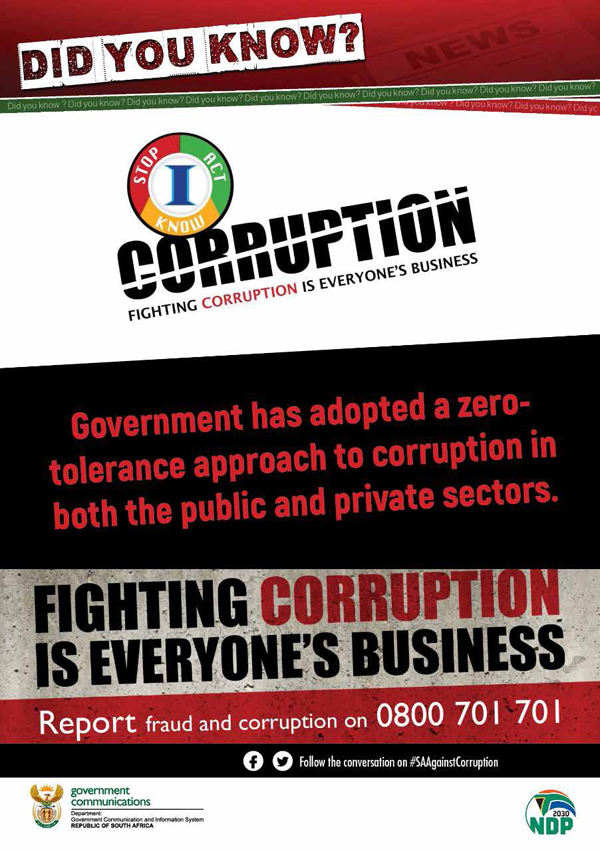
NYDA helps young entrepreneur get started
NYDA helps young entrepreneur get started Estelle GreeffA grant from the National Youth Development Agency (NYDA) has helped Pretoria youngster Marlon Morgan fulfil his dream of becoming his own boss.
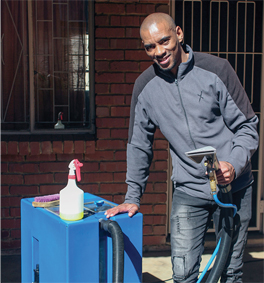 Morgan from Eersterust owns an upholstery cleaning company Drip & Dry Deep Cleaning.
Morgan from Eersterust owns an upholstery cleaning company Drip & Dry Deep Cleaning.
He says he started the business after realising there was a shortage of affordable upholstery cleaning services in the area.
Morgan is passionate about being an entrepreneur because it enables him to create jobs and contribute to economic growth. To enhance his business knowledge, Morgan read a lot of books on entrepreneurship and after coming up with the idea of opening Drip & Dry Deep Cleaning, he did an internet search to see where he could find assistance to get started.
The NYDA website held the answers he was looking for. The government agency helps young people access information, career guidance services, mentorship, skills development, training and entrepreneurial development.
Morgan was assisted along his journey of starting a business and after meeting the NYDA’s funding requirements, he received a grant of R50 000.
He says during this process, he visited the NYDA office constantly to make sure he had provided all the documents needed for his application to be approved.
He used the money to buy two deep cleaning extractor machines, two vacuum cleaners and a laptop.
Even though Morgan has only been in business for two years, he has put a lot of work and effort into making it a success. “I am now looking for funding to buy a bakkie for my business,” says Morgan.
His business runs by word of mouth, but he is working towards getting marketing material ready.
He says he started small, working only in his neighbourhood, but now also works in surrounding communities and has been able to employ someone on a part-time basis.
Morgan is excited about the future and his growing business. “I did my first big industrial job recently, cleaning 350 square metres of office carpets.”
His advice to aspiring entrepreneurs is that this is a hard venture that needs a lot of courage. “Do not always look at the closed door, open the door and go through it. Follow your passions and your dreams.”
For more information on the NYDA, visit their website at http://www.nyda.gov.za/ or contact them on 087 158 6345 / 5738, alternatively you can send an email to info@nyda.gov.za
Shared food garden unites Western Cape community
Shared food garden unites Western Cape community Estelle GreeffWhat started as a gardening hobby for Bradlene Amelia Baadtjies-Callacher (32) from Tesselaarsdal in the Western Cape has become an award-winning ‘garden of kindness’.
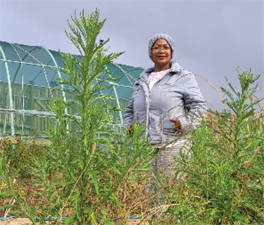 Baadtjies-Callacher's garden was recognised as the best in the youth category (household gardens) and second runner-up in the household garden category in the recent Overberg Food Garden Competition.
Baadtjies-Callacher's garden was recognised as the best in the youth category (household gardens) and second runner-up in the household garden category in the recent Overberg Food Garden Competition.
The Western Cape MEC for Agriculture, Dr Ivan Meyer, says the competition is in line with the department’s One Home, One Garden Campaign, which encourages communities to produce food sustainably.
“The campaign is a drive to combat the high levels of food insecurity and promote the well-being of local communities,” he says.
Baadtjies-Callacher says her love of gardening was cultivated by her father. “In 2020, when the national lockdown was announced, I turned my father’s backyard into a garden of kindness. Having lost my job and my start-up baking business being on hold, I found my happiness in gardening.”
Baadtjies-Callacher also invited young children who were struggling at home to join her programme. “I knew if I could share my garden with them, their problems would be forgotten – even if only for a short while. This is why I call it my garden of kindness; everything that is done here is fuelled by kindness.
“At present, I work with three young men, three young women and four children who come on a weekly rotation.”
She grows turmeric, chives, ginger, garlic, artichokes, potatoes, onions, tomatoes, beans and cabbage. “Nothing goes to waste. We pick, preserve, resell and share most of our produce. We live in a high-flood area and at times are unable to access shops, so the preserved food becomes handy. We also share seedlings and compost so others can also create their own gardens," says Baadtjies-Callacher.
She adds that she is proud of her achievements, but more so her ability to give back to the community. “Food is important, but it is even more important to produce your own. It is healthier and more nutritious.”
Baadtjies-Callacher gives the following pointers for food gardening:
• Do some research and decide what you are going to plant.
• Cordon off your gardening space to keep it safe.
• Turn over your soil to get it ready for planting.
• Tend to your garden by watering and ploughing.
• Be patient.
The sky’s the limit for SA’s first female black hot air balloon pilot
The sky’s the limit for SA’s first female black hot air balloon pilot Estelle GreeffA Tshwane go-getter wants more women to follow in her footsteps and take to the skies in a hot air balloon.
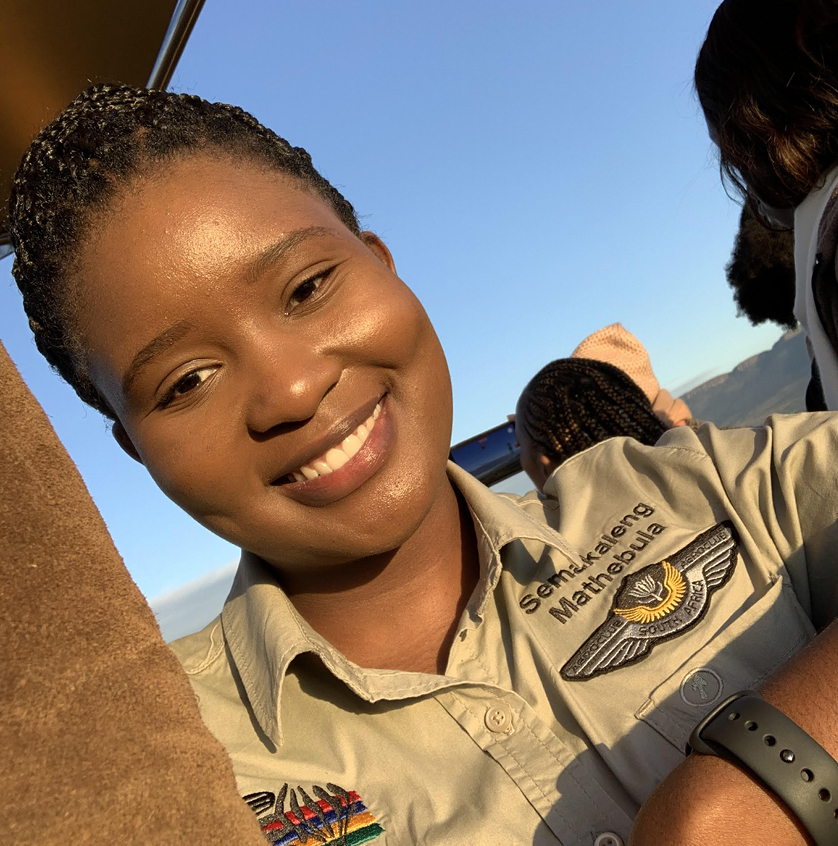 Despite going through tough times after graduating, Semakaleng Mathebula (27) was on cloud nine last year when she became South Africa’s first female black hot air balloon pilot.
Despite going through tough times after graduating, Semakaleng Mathebula (27) was on cloud nine last year when she became South Africa’s first female black hot air balloon pilot.
“After graduating, I was unemployed with limited to no prospects. After a six-month struggle, I consulted a recruitment agency, which introduced me to a balloon tour operator that was looking for a marketing assistant,” she says.
The appointment brought with it many opportunities for the Ga-Rankuwa, Tshwane, resident to learn more about the business and the sport, and she quickly fell in love with hot air balloons.
In 2019, Mathebula, who holds a Bachelor of Arts with Joint Honours in International Relations and Politics from the University of the Witwatersrand, received a training grant from the Department of Sport and Recreation and the Balloon and Airship Federation of South Africa.
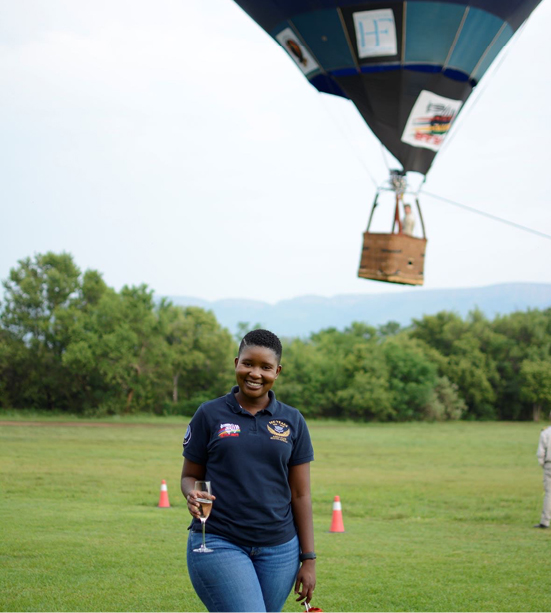 After a successful two-year training journey, she achieved her hot air balloon pilot licence in November 2021.
After a successful two-year training journey, she achieved her hot air balloon pilot licence in November 2021.
“Like all pilots, hot air balloon pilots undergo medical examinations, theoretical exams and practical flight training to obtain their private pilot licence. This is the first step towards building the hours they need to become a commercial pilot,” says Mathebula.
She is hopeful that her achievement will lead to more young trainees being awarded a study grant and that hot air balloon piloting becomes even more accessible.
For many years, she says the sport was out of reach of the majority of South Africans and was seen as a rich man’s sport. Today, only a handful of women have their pilot licences. However, Mathebula hopes that people take note of her achievement – and the fact that funding opportunities exist – and follow in her footsteps.
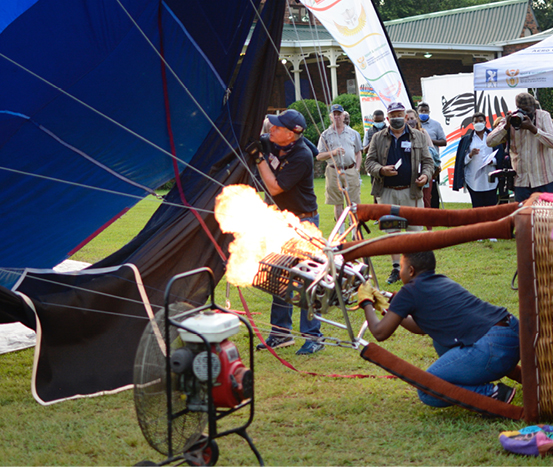 Mathebula’s journey is not over. While she loves competing in hot air balloon competitions, she now wants to secure funding to become a flight instructor and commercial pilot.
Mathebula’s journey is not over. While she loves competing in hot air balloon competitions, she now wants to secure funding to become a flight instructor and commercial pilot.
These are the next steps in her journey and along the way, she hopes to encourage many other young people – especially women – to take up the sport.
She says hot air ballooning presents not only a world of adventure, but also a fruitful career path for those willing and determined. “The industry needs more young people to walk through its doors, and I will hold them open,” she says.
For more information contact the Ballon and Airship Federation of South Africa on www.bafsa.co.za
